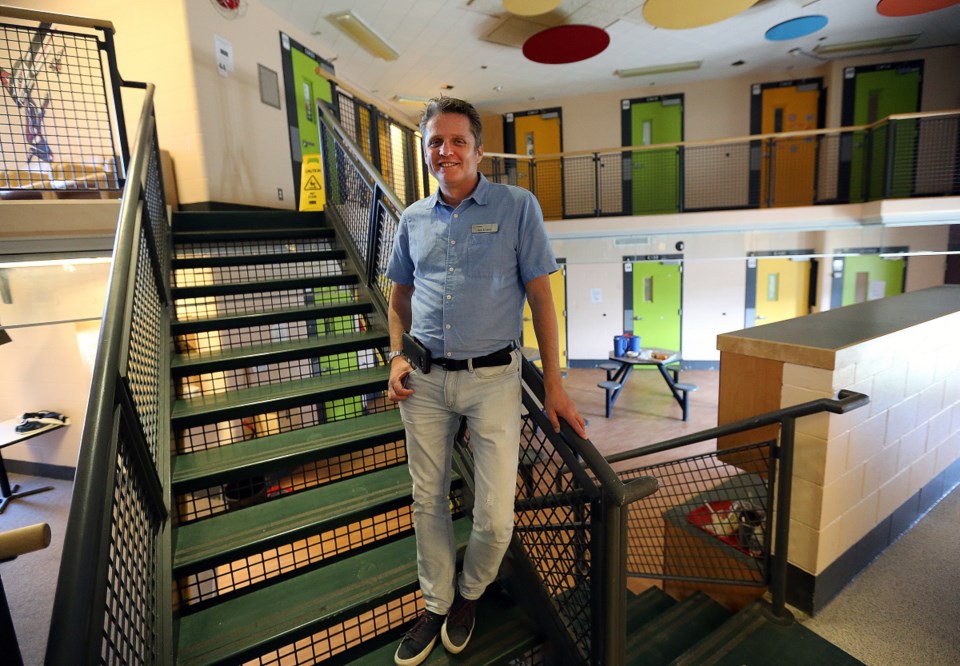The former youth jail turned homeless shelter in View Royal could become an addictions-recovery centre, but it would require a $4.7-million investment from the provincial government.
The recovery centre could provide a 12-to-24-month treatment program for as many as 50 people who are caught in the revolving door of addiction, homelessness and jail, said Don Evans, executive director of Our Place Society.
“We believe there’s a large demand for this,” he said. “There’s a population that is battling severe addiction and is regularly in contact with the criminal-justice system. There’s a lot of trauma in their lives that doesn’t get addressed in short-term treatment programs.”
Our Place runs Choices transitional shelter, which was set up in the former youth jail to provide temporary housing for 50 people after the tent city in downtown Victoria was shut down last August. Residents are able to consume alcohol and drugs on site, which has been challenging for the small number of residents who have gotten clean, Evans said.
The Talcott Road shelter has also been a source of tension in the residential neighbourhood, with some neighbours complaining about loitering and incidents of theft.
View Royal council has given the shelter permission to operate until December, which is why Evans and an advisory group worked to come up with a better use for the shuttered jail.
The program would prohibit drug or alcohol consumption and would allow people to use only methadone or suboxone opioid-replacement therapies when they are beginning their recovery.
Evans has requested a meeting with Judy Darcy, the province’s new minister of mental health and addictions, to ask for the $4.7 million, which would be needed to run the facility for seven years. Our Place Society is trying to raise an additional $1.5 million. After seven years, the facility would be funded through private donations.
The facility would need rezoning approval from the Town of View Royal, which would include public consultation.
View Royal Mayor David Screech said residents have made it clear they’re unhappy with the existing shelter, but there could be more tolerance for a dry recovery centre.
“It would be a very different facility than Choices,” he said. “There would be no tolerance for any drugs or alcohol, and I think that would go a long way to gaining the support of the local community.”
Screech said dealing with homelessness and addiction needs a regional solution.
“There’s no doubt in Greater Victoria that the type of facility being proposed is desperately needed. On that basis alone, it is obviously well worth considering.”
Currently, people who want to quit drugs or alcohol face limited options. They can enter a 10-day detox and month-long stabilization program, but those options lack intensive therapy to deal with the root cause of someone’s addiction, Evans said. As a result, people often relapse once they’re back in the community, he said, which perpetuates a sense of failure and worthlessness.
The private recovery centres on the Island costs tens of thousands of dollars and are out of reach for low-income people.
The recovery centre would be modelled on a successful therapeutic program in Italy called San Patrignano, which has inspired similar programs in Nanaimo, Prince George and Surrey. It would have around-the-clock staff, including doctors, nurses, psychiatrists and mental-health workers.
As residents achieve milestones in their recovery plans, they would be given more responsibilities and would eventually become mentors and leaders for newcomers, Evans said.
Participants would learn business and communication skills, learn to cook their own meals, grow their own food and create items that can be sold for income.
The recovery centre would work closely with Island Health and B.C. Corrections for referrals to the program.
“There will be therapies to deal with criminality, changing violent behaviour and criminal thinking, dealing with trauma, mental health and brain injuries,” Evans said.
Evans has been working closely with Victoria’s Integrated Court, so that individuals charged with an offence can be sent to the recovery centre instead of jail.
“[Judges] don’t want to send people to jail. They want to see people get help and they need to see the resources in the community to be able to do that,” Evans said. “So this provides that for them.”



